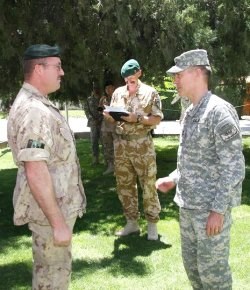SooToday.com has received another e-mail update from Lieutenant Colonel Eric Groulx, the former commanding officer of Sault Ste. Marie's 49th Field Artillery Regiment.
The local soldier writes from Afghanistan, where he's serving with the Canadian Forces.
Shown is an image of Lt. Col. Groulx receiving a special coin from U.S. Major General Bernard Champoux, the International Security Assistance Force chief of staff for operations.
The image gallery accompanying this article is comprised of photos from around Kabul and other areas of operation.
************************* Eighth letter home
Hello from Kabul.
I guess that it has been a little while since I have written.
It is difficult to describe how busy I have been here, and how intense some of my work has been.
Given the requirements for operational security, I cannot tell you everything, but I am anxious to tell you about some of my recent experiences.
The best way to describe what I have been doing is to say: Wow!
The position that I have been working in is newly created.
I act as the linkage between International Security Assistance Force (ISAF) and the Afghan army at the national level.
I work for the ISAF Operations Centre, and spend my days in the Afghan Army Operations Centre.
In the past, there was not any current operations connection at the national level between the Afghan army and ISAF.
I am kept busy day and night, and we are trying to get three people in my position so that we can man the post 24 hours per day.
I have been very closely involved in the coordination of support for a number of battles across the country.
Most of the time, support to the Afghan army or police occurs at a much lower level – as it should.
However, in some situations, I have been brought in to coordinate support from ISAF.
Often these calls for support come in late at night, and are always urgent.
As there is not any ISAF forces with them, and we want to provide support, we need to communicate with someone on the friendly side that is in the location.
I quickly dig down the chain of command to find cell phone or satellite phone numbers for the Afghan commander in that location.
I talk to them through an interpreter, and I usually have the phone on speaker so that I can hear the tone of their voice.
I have had a few situations where I am talking to someone who is currently under fire.
I can hear the bullets, and explosions of indirect fire.
In one case, I could hear the glass smashing as the windows of their building were destroyed due to percussion of incoming mortar rounds.
Once I can confirm their location and the location of all friendly forces, I can coordinate the fire support that is needed to save them.
I have had one experience where I could hear the voices and explosions while I was watching the situation on a video feed from the aircraft over the site.
Through my interpreter on the telephone, I was able to identify the friendly and enemy on the ground, and help direct the fire support onto the enemy who were in the midst of attacking this district centre.
I could hear our own bombs and missiles come in, and see the results on the video feed. It is a bit like a video game, but with very real results.
It is so important to maintain a proper perspective on what you are doing.
It would be easy to become casual and cavalier about your actions.
You are sitting in a comfortable environment – not in any danger, and yet you are dealing with matters of life and death.
Errors are not tolerated, and the consequences of your actions are lethal.
This is not a daily occurrence, but it does happen regularly enough that we joke that my cell phone is becoming the 911 number for the Afghan Security Forces.
We do realize that this is not the correct way to provide support, but until we can get the system working better, if it is something that we must do to save lives, then we will.
I had an interesting experience with one of these situations where we provided support to save the lives of people under attack, and when it was over the police in this centre advised that they had four people with injuries.
Three were not too bad off, but the fourth police officer had a piece of shrapnel lodged in his face, and he was bleeding badly.
I spent a lot of time trying to arrange medical evacuation for this unfortunate officer.
However, for a number of reasons, this officer could not be evacuated.
It was a very remote location, and the roads in or out were owned by the enemy.
The only way to get him out quickly was by air.
Of the countries in range, none were willing to provide the helicopter support to get him out.
To be clear, it would not be easy – a medevac helicopter would have to be accompanied by one or two attack helicopters to ensure their safety, and it would be high risk.
A week later, some of the local people in the village managed to pull the shrapnel out of the man's face, and the bleeding was controlled.
I called them daily to monitor his situation, and tried everything I could do to try to have him evacuated, but failed.
To continue reading this story and view the accompanying photos, please click here.
